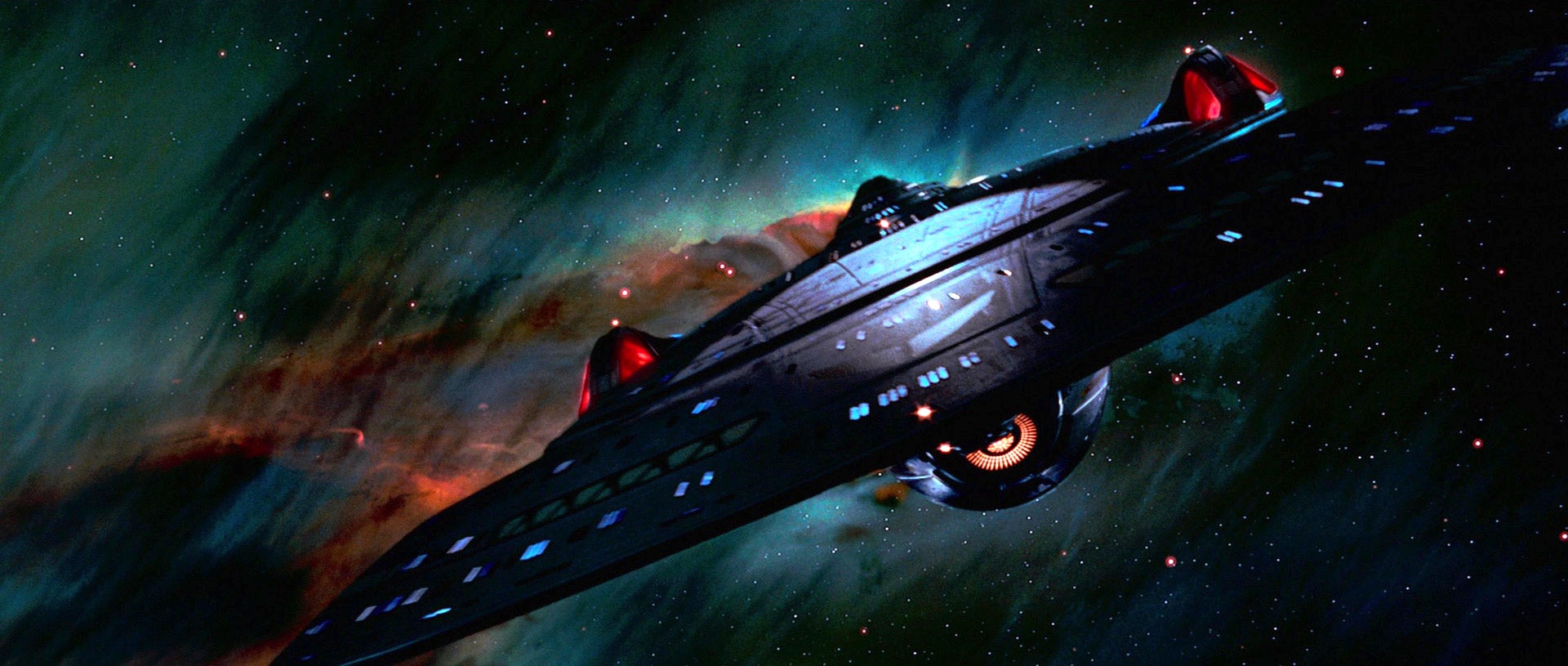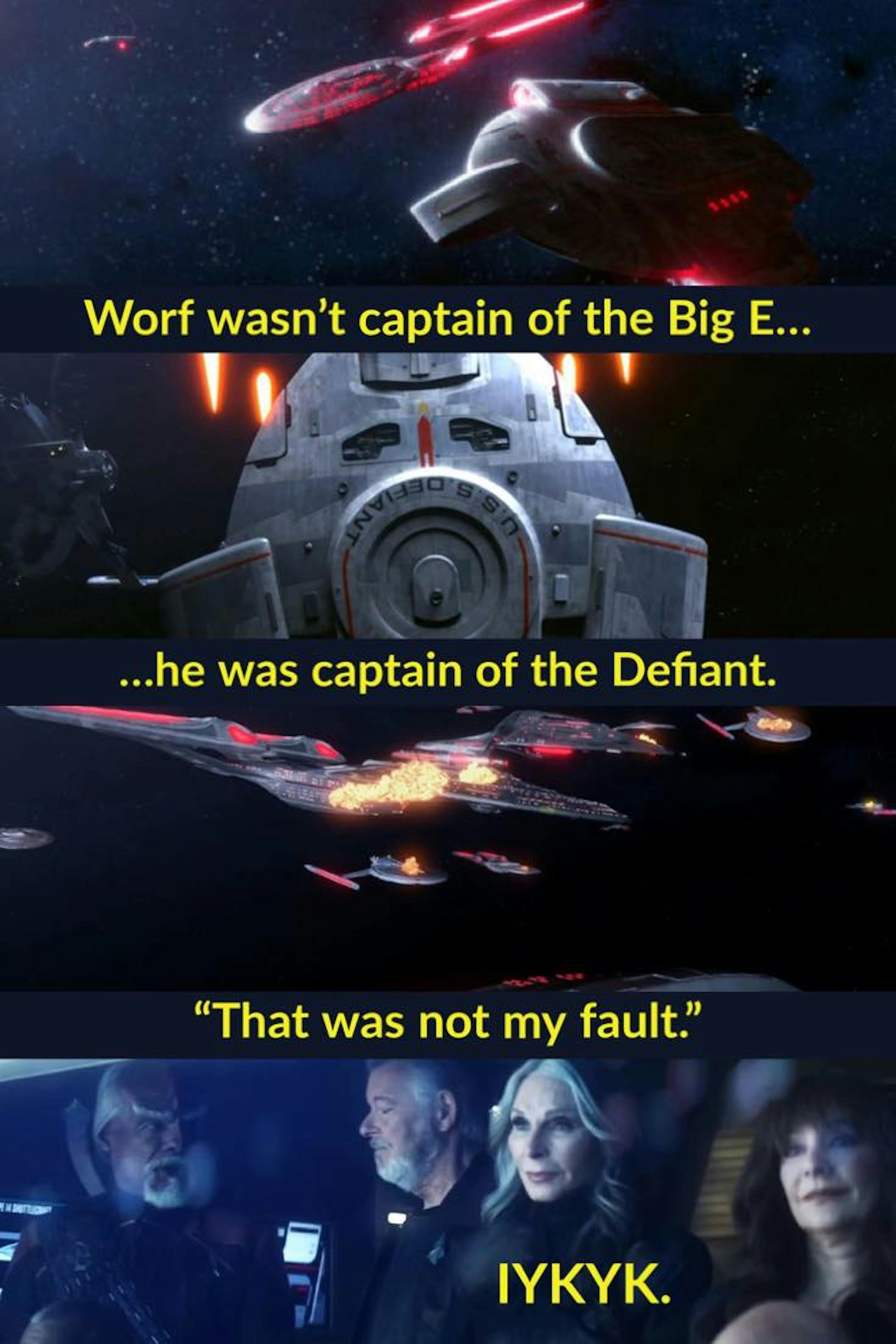
The mystery of what happened to one version of the USS Enterprise might have an unexpected and somewhat hilarious solution. In Star Trek: Picard Season 3, the USS Enterprise-F is seen briefly under the command of Admiral Shelby (Elizabeth Dennehy), the Titan is rechristened the Enterprise-G in the season’s final moments, and Geordi (LeVar Burton) reveals that he restored the Enterprise-D following the saucer section crash in Generations.
But what happened to the Enterprise-E — the ship that Picard (Patrick Stewart) captained in three Next Generation feature films? In Picard Season 3, it’s humorously implied that the demise of the Enterprise-E was Worf’s doing, despite the Klingon protesting, “That was not my fault.” The line was never entirely explained, but now, thanks to a fan-made meme and a comment from a Star Trek: Prodigy writer, it seems like Worf was right. It wasn’t his fault!
Back when Prodigy Season 1 aired its finale, a slew of beloved starships made brief flyby cameos, including the Enterprise-E and Deep Space Nine’s Defiant. At the time, Inverse asked Prodigy showrunners Kevin and Dan Hageman if they could tell us who was in command of the Defiant, and they responded, “We can’t answer that.” But now, a fan theory suggests it was Worf.
Over on the Star Trek S***posting Facebook group, a meme suggests that if Worf was in command of the Defiant in 2384, two big questions have suddenly been answered. Because Prodigy’s villain, an AI construct created by the Vau N'Akat, forced the Starfleet ships to attack each other, the Defiant is seen firing on the Enterprise-E. If this battle rendered the Enterprise-E unsalvageable, that would explain why the ship wasn’t available in 2401. It would also explain why the crew messes with Worf. If Worf was in command of the Defiant during the Prodigy Season 1 finale, then it was his ship putting the Enterprise-E out of commission. But, because the AI controlled all those ships, Worf would be justified in saying, “That was not my fault.”

Is this the answer? Clearly, this is all in good fun, but Prodigy writer Aaron J. Waltke did reply to the meme with “This is canon.”
While never seen on screen, the supplementary Picard Logs released on Instagram suggest the Enterprise-E was under Worf’s command at some point after 2384, until “an incident at Kriilar Prime” caused Worf to leave the ship. That tidbit also says the Enterprise-E was out of service during a classified mission after 2386, a year after the Synth Attack on Mars in Picard Season 1, and two years after the finale of Prodigy Season 1.
In 2023, Terry Matalas commented on the mystery, saying, “Somebody can tell that story someday about what happened with Worf and the Enterprise-E, but it's more fun to imagine yourself all the possibilities. Is it lost in an interdimensional rift and it’s still out there somewhere? Was it an accidental self-destruct? Who knows? The question is almost better than the answer.”
But if the Enterprise-E’s activities during 2385-2386 are only semi-canonical (or so secretive that the dates in question were falsified), then the idea that the Defiant unwillingly attacked the Enterprise-E in Prodigy is a pretty good explanation. When reached for comment by Inverse, Prodigy writer Aaron J. Waltke offered this response to the mystery:
“There are a few things we know are true, in the mystery surrounding the fate of Worf and the Enterprise-E. First, Picard was no longer captain of the Enterprise during the Romulan Evacuation. Second, the Defiant was present at Gamma Serpentis in the battle with the Living Construct, where it lost control and destroyed other Starfleet ships. A fleet of Sovereign-class ships were damaged or destroyed there, including the USS Sovereign and a ship that looks suspiciously like the Enterprise-E.”
Does this provide us with the smoking phaser that lets Worf off the hook and explains who the Captain of the Defiant was at that moment? Maybe, maybe not. But it’s certainly fun to think about.
“Sometimes, Star Trek is a bit more like forensic anthropology,” Waltke says. “It’s always a delight when a theory becomes more probable by virtue of fans who connect the dots so thoroughly.”
Star Trek: Picard streams on Paramount+. Star Trek: Prodigy streams on Netflix.
Phasers on Stun!: How the Making — and Remaking — of Star Trek Changed the World
Amazon







